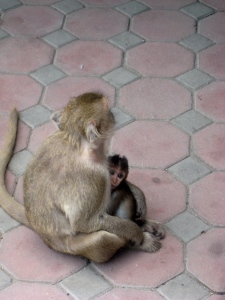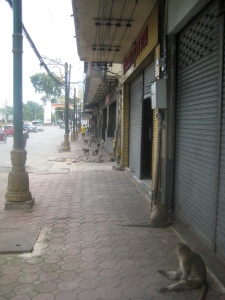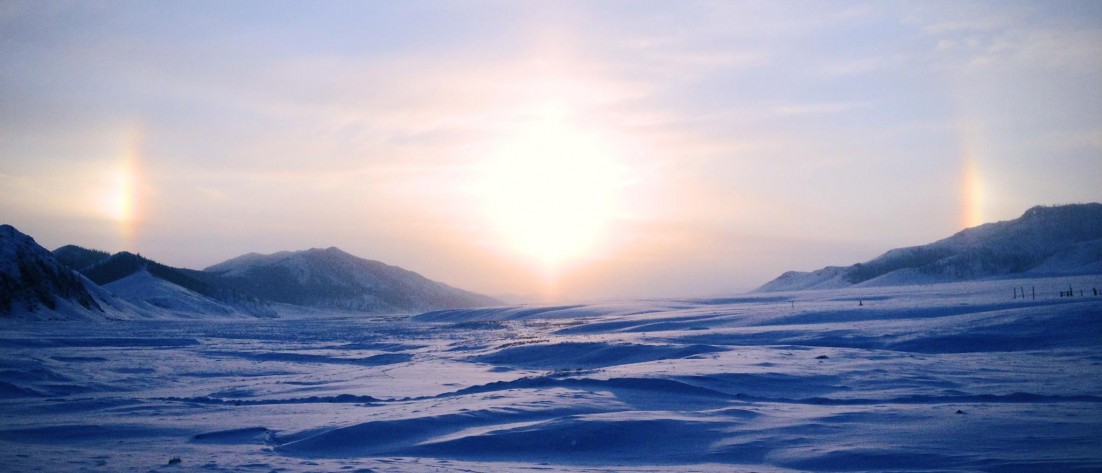This is Part IV of my Thailand Tuesdays series. If you’ve missed them, please check out the Introduction, Part I, Part II, and Part III.
There’s nothing quite like waking up to an unidentifiable sound in a place you hadn’t expected to be.
I grew up in midwestern America, where rooftop rustling is common heard and easy explained. The vast majority of the time, that scratching sound your window or above your head is the scrabbling of a squirrel–if you’re very unlucky, a raccoon. But after a year in Mongolia, I’d grown unaccustomed to the sound. I quickly placed my location, my bandaged hand reminding me how I’d landed in a hotel in Lopburi, but the noise still perplexed me.
Then I got up and looked around the room, and all was explained. I’ve seen plenty of warnings printed on the back of hotel doors, but this one was a first:
Please do not open the windows, or monkeys may steal your belongings.
I hadn’t done any research on Lopburi prior to arriving, and it wasn’t in my northern-focused guidebook, so I took to the internet. Lopburi, it turns out, is the kind of city where WikiTravel’s Sleep section is divided into two categories: “Places with lots of monkeys” and “Places with few monkeys.” The better hotels in Old Town, which plays host to most of the monkeys, are enclosed by cages that keep them at bay, allowing the guests to open their windows. Clearly, mine was not one of these.
After acquiring a map of the city, I purchased a ticket to a fenced-off brick ruin and found it to house hundreds of the things. An older Thai gentleman approached me once I entered the compound and offered to sell me a plastic bag of corn, saying that feeding the monkeys would keep them from biting. I declined, envisioning myself besieged by hungry, demanding simians. My fears proved well-founded: the next pair of tourists to enter the gate found themselves swarmed. The monkey sitting at your feet, reaching inquisitive fingers up to take a piece of corn from your hand, is cute; the one that climbs atop your backpack and refuses to be dislodged, not so much. The ones that jump you from behind when you try to back away, grabbing hold of your jeans and swinging themselves up towards your face, are downright terrifying. I came to the couple’s aid, swatting at the monkeys with my map and my water bottle, and we all beat a hasty retreat to the street.
 Even there, we weren’t entirely safe. The fence was there to keep the tourists out; it did nothing whatsoever for the monkeys. They were everywhere in this part of the town: roaming the streets, lazing on the sidewalks, walking the power lines, even invading some of the ground-floor stores. I snapped a few pictures of the admittedly adorable babies but quickly discovered what the locals already know: they are clever, mischievous pests, made all the more pestilential by their intelligence and opposable thumbs. What I really wanted was a monkey stick, one of those long bamboo rods the shopkeepers used to to keep the macaques at bay without coming in range of their teeth. Lacking such a device, I tread amongst them with care. Never have I been so aware of my lack of a rabies vaccination as I was as I made my slow way through the monkey gauntlet, doing my utmost not step on anyone’s tail.
Even there, we weren’t entirely safe. The fence was there to keep the tourists out; it did nothing whatsoever for the monkeys. They were everywhere in this part of the town: roaming the streets, lazing on the sidewalks, walking the power lines, even invading some of the ground-floor stores. I snapped a few pictures of the admittedly adorable babies but quickly discovered what the locals already know: they are clever, mischievous pests, made all the more pestilential by their intelligence and opposable thumbs. What I really wanted was a monkey stick, one of those long bamboo rods the shopkeepers used to to keep the macaques at bay without coming in range of their teeth. Lacking such a device, I tread amongst them with care. Never have I been so aware of my lack of a rabies vaccination as I was as I made my slow way through the monkey gauntlet, doing my utmost not step on anyone’s tail.
 In all respects but one, though, I made my way through the city without incident. My bandaged hand drew a lot of attention throughout the day, and I found myself continually having to explain that it was not (thankfully!) from a monkey bite. The nurses at the clinic I visited in the afternoon were among those who asked the question. I’d been instructed to have the bandages on my hand rewrapped every day, and while that seemed like overkill, the sheer difficulty of keeping the gauze clean and neat convinced me to have it done at least on that first day.
In all respects but one, though, I made my way through the city without incident. My bandaged hand drew a lot of attention throughout the day, and I found myself continually having to explain that it was not (thankfully!) from a monkey bite. The nurses at the clinic I visited in the afternoon were among those who asked the question. I’d been instructed to have the bandages on my hand rewrapped every day, and while that seemed like overkill, the sheer difficulty of keeping the gauze clean and neat convinced me to have it done at least on that first day.
Of course, it was after paying to have my hand rewrapped that I tripped on a curb and instinctively put out my hands to break my fall. Not a good instinct: the impact pulled at my stitches and, I could have sworn, every nerve ending in that hand. I had not cried once the previous evening, but at the blinding flash of agony that seared through my hand when it hit the ground, I sank to the curb and sobbed as the reopened wound quickly bled through my freshly wrapped bandages. When I reappeared at the clinic, tearstained and bloody, less than an hour after I’d left it, the nurse took pity on me and patched my hand up for free. After both flows had ebbed, I thanked her and resumed my explorations.
If Ayutthaya had reminded me of The Jungle Book, the profusion of primates in Lopburi meant that the feeling was only intensified here. At any moment, I half-expected to encounter King Louie’s wonderfully danceable demands for fire. (Monkeys with fire, by the way, is a terrifying thought.)
Lopburi’s ruins were as plentiful as Ayutthaya’s, and often easier to access. Again and again, I found myself awed by the scale and intricacy of these ancient temples, not to mention the fact that I was actually allowed to enter them. I’m a total sucker for interesting places to sit and write, so I broke out my journal for a peaceful half an hour at one of the temples. With so many sites to see, it was hard to rationalize staying any longer, but if I had access to these kinds of ruins on a daily basis, I’m sure I’d visit regularly to write. How can you not be inspired by the majesty of an ancient yet still-standing chedi, or the mystery of a gallery of headless Buddha figures?
As the afternoon waned, however, my tour of Lopburi was cut short. I had intended to head across the tracks to the eat side of town, which I’d neglected in my wanderings, while I waited for my train to Phitsanulok, but a look at the skies was all it took me to scrap those plans. The clouds overhead meant business, reminding me that it was, after all, the rainy season. When the women at the night market stands started battening down the hatches against the strengthening wind, I decided that sticking close to the train station might be prudent.
The rain, when it came, was sudden and intense; not the most drenching downpour I’d seen that summer, but not one I’d want to face unprotected either. I took shelter under streetside awnings along with others caught in the deluge, slowly working my way as close to the train station as I could without getting completely soaked. Thankfully, it soon subsided to a gentle drizzle I was happy to brave, and a breeze and welcome cool followed in its wake. Sitting on the platform to finish recording the day’s experiences, I was comfortable outdoors for for the first time since arriving in Thailand.











